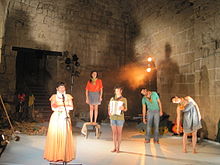
Galilee is a region located in northern Israel and southern Lebanon. Galilee traditionally refers to the mountainous part, divided into Upper Galilee and Lower Galilee.
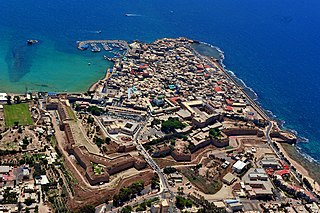
Acre, known locally as Akko and Akka, is a city in the coastal plain region of the Northern District of Israel.

Karmiel is a city in northern Israel. Established in 1964 as a development town, Karmiel is located in the Beit HaKerem Valley which divides upper and lower Galilee. The city is located south of the Acre–Safed road, 32 kilometres from Safed and 20 km from Ma'alot-Tarshiha and 20 km (12 mi) from Acre. In 2021 Karmiel had a population of 46,311.

Nof HaGalil is a city in the Northern District of Israel with a population of 42,657.

Festál is a free series of annual ethnically-related festivals that take place on the grounds of Seattle Center in Seattle, Washington. A major cultural program of Seattle, these festivals aim to celebrate and connect the city to its varied ethnic and international community. Most festivals contain various arts performances, dances, marketplace and other programs. These have also come to be the annual gathering place for ethnic groups of the community. Both older and younger people attend, especially the dances and musical concerts.
Montreal was referred to as "Canada's Cultural Capital" by Monocle Magazine. The city is Canada's centre for French-language television productions, radio, theatre, film, multimedia, and print publishing. The Quartier Latin is a neighbourhood crowded with cafés animated by this literary and musical activity. Montreal's many cultural communities have given it a distinct local culture.

Shlomo Gronich is an Israeli composer, singer, songwriter, arranger, and choir conductor.

Mohammad Bakri is a Palestinian actor and film director.
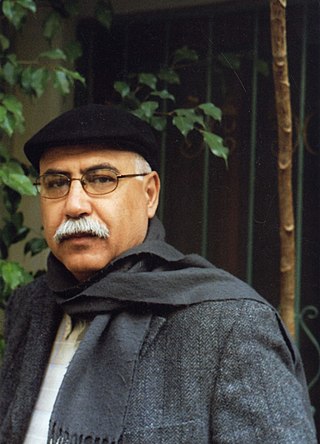
Fouad Awad is an avant-garde Israeli-Palestinian theatre director, and a prominent figure in the Palestinian theatrical movement.
The Jewish-Arab Center (JAC) is a multidisciplinary research institute in the University of Haifa in Haifa, Israel, active since 1972. The head of the center since 2014 is Prof. Rassem Khamaisi.
Theatre Company Jerusalem (TCJ) fuses contemporary performing arts with ancient Hebrew and Aramaic writings to create theatre.
Avishay Hadari is an Israeli artist, theatre director, painter and graphic designer.

The Arab-Hebrew Theater or Al Saraya Theater is a multilingual theater located in the Old Saraya House in the Old City of Jaffa. It serves as a stage for two theater companies working independently and together in two languages: Hebrew and Arabic. The Hebrew company is "Teatron Mekomi ", which was established in 1990 by Yigal Ezrati and Gabi Eldor, and the Arab company is "Al-Saraya", which was established in 1998. The theater is partially funded by the Ministry of Culture and the Tel Aviv Municipality. The theater has three arts directors: Mohammad Bakri, Yigal Ezrati, and Gabi Eldor.
HaNephesh Theater is a Jewish fringe theater established in 1978 by Howard Rypp and Gabriel Emanuel in Canada. At the time of its founding, HaNefesh was the only professional Jewish theater in Canada, where it produced approximately 40 theatrical and television productions. In 1980 the theater produced its first play, Children of the Night. The play, which tells the story of Janusz Korczak, was featured in the first International Jewish Theater Festival in New York City.

Gerard Behar Center is a major arts centre in Jerusalem, Israel, for independent theatre, dance, and musical productions, children's shows, art exhibitions, artist workshops, and festivals. In 2010 the center hosted over 900 events with attendance in excess of 263,600 participants. The center includes two theatres and is home to two dance companies, Kolben and Vertigo.
The Academy of Performing Arts is a theatre centre and a school of theatre and performance, operating since 2010 in Tel Aviv, in collaboration with the Open University of Israel.

Tal Itzhaki is an Israeli theatre designer and director of the Academy of Performing Arts, Tel Aviv, a translator of plays and prose into Hebrew, and a peace activist.
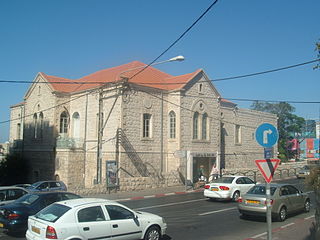
Beit Ha'Gefen — The Arab-Jewish Cultural Center in Haifa is a multi-cultural organization that aims to bring together Arabs and Jews and promote coexistence and tolerance.

In Israel, the mixed cities or mixed towns are the eight cities with a significant number of both Israeli Jews and Israeli Arabs. The eight mixed Jewish-Arab cities, defined by the Israel Central Bureau of Statistics as those with more than 10% of the population registered as "Arabs" and more than 10% of the population registered as "Jews", include the following seven Israeli cities: Haifa, Lod, Ramle, Jaffa, Acre, Nof HaGalil, and Ma'alot Tarshiha. Approximately 10% of the Arab citizens of Israel live in these seven cities. The eighth city is Jerusalem, in which the Arab part of the city, East Jerusalem, has been annexed by Israel but is not recognized as such under international law.
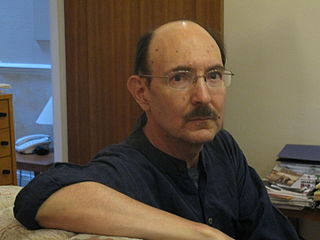
Avner Ben-Amos is an Israeli historian of education, an emeritus professor at Tel Aviv University School of Education, a playwright, and a social activist.

